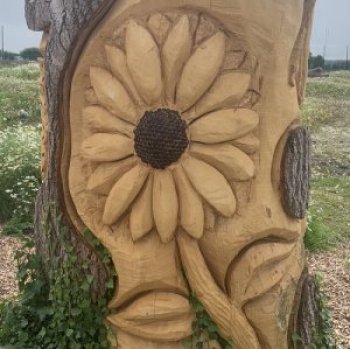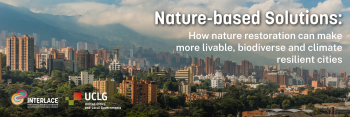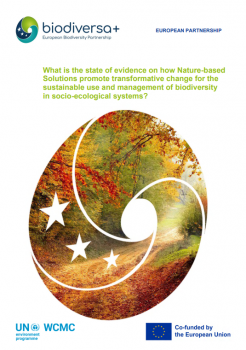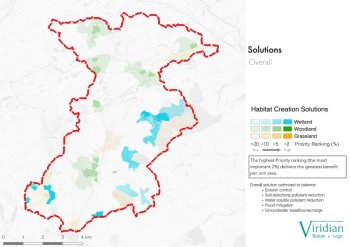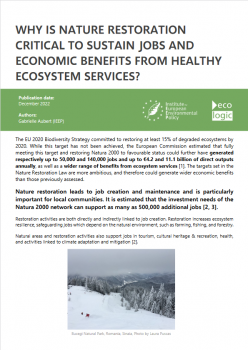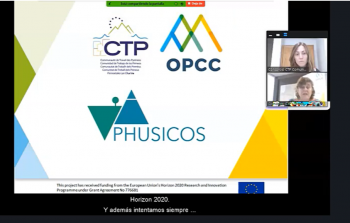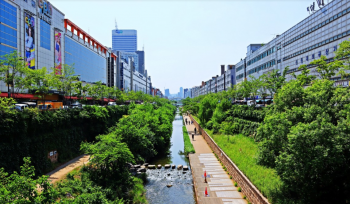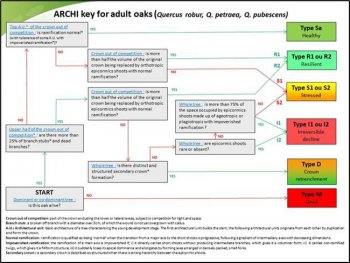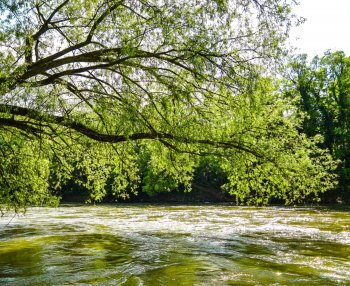Green space and mortality in European cities: a health impact assessment study / The Lancet Planetary Health
Natural outdoor environments including green spaces play an important role in preserving population health and wellbeing in cities, but the number of deaths that could be prevented by increasing green space in European cities is not known. This study aimed to estimate the number of natural-cause
INTERLACE MOOC on Nature-based Solutions: (6) MONITORING and evaluating NbS using a co-creation approach
Urban areas across the globe are facing unprecedented challenges—pollution, climate change, urban sprawl—and traditional solutions are falling short. The INTERLACE project’s Massive Open Online Course showcases how nature-based solutions offer a promising approach to help create resilient,
BIODIVERZITÁS: Élőhely-kezelés
A Debreceni Egyetem átfogó munkája a természeti területekre és azok használatára, kezelésére vonatkozó tudásanyagot gyűjti össze egy nagy oktató dokumentumban. Sorba veszi a különböző típusú élőhelyeket, mint a vízi, erdő vagy gyepes területek, a tananyag foglalkozik ezen típusok jelenlegi
PONDERFUL INFORMATION SYSTEM
The Information Platform of the PONDERFUL and the AQUACROSS projects seeks to advance the implementation of Nature-based solutions using aquatic ecosystems for the delivery of ecosystem services, biodiversity conservation and climate change mitigation and adaptation.
Addressing climate change in cities: Policy instruments to promote urban nature-based solutions
This guidance document responds to gaps and highlights a range of policy and supporting instruments relevant for NbS design, implementation and maintenance. Policy instruments include regulations, strategies, programmes, action plans and financial incentives. Each instrument is briefly described
Viridian modelling of nature-based solutions
We use sophisticated modelling to identify, rank and prioritise Nature-based Solutions to multiple problems such as flooding, water resource supply, river pollution, soil loss, poor farm management and biodiversity loss. Our engaging communications show best bang for buck actions, with many
Biodiversity Quality Calculator - Measuring Impacts on Biodiversity
The Biodiversity Quality Calculator is an online tool currently in development. It aims to provide comprehensive and robust biodiversity indices, including biomass, species rarity and population evenness. We are currently developing an online tool which allows data to be uploaded to the platform,
Why is nature restoration critical to sustain jobs and economic benefits from healthy ecosystem services?
Nature restoration leads to job creation and maintenance and is particularly important for local communities. It is estimated that the investment needs of the Natura 2000 network can support as many as 500,000 additional jobs. Restoration activities are both directly and indirectly linked to job
What is PHUSICOS / ¿Qué es PHUSICOS?
Presentation of the PHUSICOS project / Presentación del proyecto PHUSICOS
- Document
Enhancing Additionality Assessment of Carbon Credit of Various Interventions by Utilizing Site-Specific Historical Data in Compliance with IPCC International Standards
In carbon credit additionality projects, precise quantification methods are crucial to prevent incorrect estimations. The project activities and results demonstrated that active forest management generates additionality and, consequently, carbon credits.
ZÖLD-KÉK INFRASTRUKTÚRA: Zöld(-kék) infrastruktúra workshop önkormányzatok részére című esemény előadásai (2023.11.14.)
Magyarország Miniszterelnökségének Közlekedési, Környezeti és Energiahatékonysági Fejlesztési Programok Végrehajtásáért Felelős Helyettes Államtitkársága 2023. november 14-én szakmai szemléletformáló rendezvényt szervezett ”Zöld-(kék) infrastruktúra (ZI) workshop Önkormányzatok részére” címmel.
- Video
PHUSICOS: Snow avalanches at Capet Forest
The hazard at the site is from snow avalanches in the 'Midaou' avalanche path. The avalanches may reach the village of Barèges, and this has occurred numerous times in the past, the last event being in 2013. The slope and the release area have numerous old 'grey' protective
- Document
Pine Wood Nematode
This project aimed to overcome the constraints caused by PWD, combining new forms of forest management, methods of early detection of infected trees and decrease their impact.
ZÖLD-KÉK INFRASTRUKTÚRA: Városi kékinfrastruktúra, városi zöldinfrastruktúra jógyakorlatok
A Szent István Egyetem Tájépítészeti és Településtervezési kara által az URBACT BINIR projekt keretén belül készített összefoglaló anyag. A zöldinfrastruktúrának nem csak az ökoszísztémára van pozitív hatása, hanem a társadalom egészségi állapotára, a település gazdasági vonzerejére, valamint az
Vigil'encre: Participatory science tool for epidemiological surveillance of chestnut ink
An app to diagnoze and report suspected cases with precise information and geolocation data for epidemiological surveillance of Phytophthora, helping in understanding disease distribution and its interactions with drought
Conexus key learning factsheet series - Checklist for Nature-based Solutions Monitoring & Indicators
Monitoring & Indicators (M&I) help document and evaluate the process, progress, performance, and impact of the implementation of Nature-based Solutions (NbS), as well as track whether targets are being met. To support the uptake of M&I in planning practice, this factsheet provides a
- Document
Keys for Forest Types Classification Schemes to support the reporting of Support Sustainable Forest Management Indicators in Various Contexts
For biodiversity monitoring, GO-SURF has emphasized the need for standardization efforts, even through simple solutions such as transition tables.
Can ‘nature-based solutions’ help address climate change?
These so-called “nature-based solutions” are key to many countries’ and companies’ plans to achieve net-zero in the coming decades. Nature-based solutions also featured more prominently than before at the UN’s COP26 climate summit in Glasgow last month. The term briefly made an appearance in a
- Document
Using UAV photogrammetric data to support multi-objective forest management plans
In Italy and Europe, there is a growing demand for forest and agroforestry companies to prioritize multifunctionality and certification. The first step involves obtaining spatial data to derive multifunctionality indicators for developing multi-objective management plans.
- ‹ previous
- 2 of 20
- next ›

